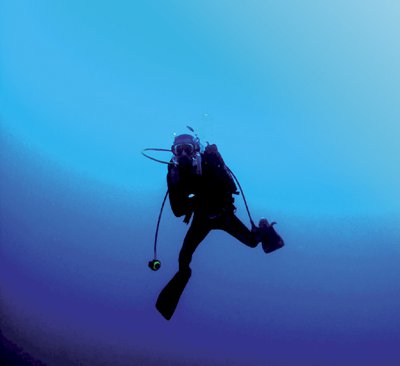Phuket Diving: Just take a deep breath

PHUKET: Nobody wants to be the “heavy breather” – especially when you’re diving in Phuket’s waters. Unfortunately, they are out there, and for sometime I was one.
My breathing was the limiting factor on any dive and not my decompression limit.
Most instructors, dive masters and dive buddies are nice about it, but prematurely coming to the surface can hurt your pride. But more importantly it caps your bottom time, which means less time to search the dark nooks and crannies of the reef for bamboo sharks.
I didn’t want to be last to jump and first back on the surface.
I didn’t want to be the only person the dive master asked, “How much air?”
And I sure didn’t want to know that my dive buddy had well over 150 bar left in his tank when the dive was called.
Shuffling towards the bow of the boat in my fins with my regulator in my mouth, I was immediately nervous about burning through all my air – that’s where it started.
However, there are options out there for us heavy breathers who aren’t prepared to spend an hour in gym everyday, just to put some bar back in our tanks.
Freediving courses are a stunning solution. When you only get one breath per dive, being relaxed, calm and making that one count is naturally of the utmost importance. I’ve heard of first-time divers with freediving backgrounds, who have air consumption on their first dive that rivals their instructor’s.
There is also the gear option, and at first I thought that was going to have to be my solution. Though I’d pass on the forty pound aluminum 100, I found myself asking for high-pressure steel 100, which gave me almost 35 extra bar per dive – over 10 per cent more.
But it was a short-term solution. Bigger tanks cost more, and even then, someone with good air consumption is literally going to blow you out of the water.
I was streamlined, didn’t burn extra oxygen with unnecessary movements and didn’t have to keep my BCD partially inflated to compensate for over-weighting, yet I was still struggling. I couldn’t relax, because I knew that I was going to suck wind faster than a tornado.
After having a stunted dive early in the season, my instructor kindly offered some advice, a couple of breathing exercises that would put bar back in my tank – and they have.
The first is the oldest trick in the book when it comes to breathing: “belly breathing”. It’s a practice used in Tai Chi, yoga and freediving. Many of us breathe only with our chests. We take a big breath, and our shoulders go up and our chest goes out. We really aren’t taking a deep, relaxed, breath.
On deck, we reviewed belly breathing, deep breaths that start with the gentle, relaxed expansion of the abdominal region. With both hands held lightly over your abdomen you can feel the expansion. Then gently, you empty your lungs, starting by tightening your abs. That was it. Practice at work, practice at dinner, practice while on Facebook and put air back into your tank for another dive.
The second trick was just as simple as the first. You can breath out for longer than you breathe in. The average person, when relaxed, has an in-breath of about five seconds and out breath of about seven seconds. But, the deferential between the two can be expanded on, with a little practice.
So, lying in bed, prepping my dreams with day dreams of shipwrecks, I count five seconds in and seven out. In for five seconds and out for nine. Slowly increasing, until the long casual exhales become second nature and I’m somewhere on the alleged Captain Morgan wreck off Panama taking advantage of the extra bottom time.
— Isaac Stone Simonelli
Latest Thailand News
Follow The Thaiger on Google News:


























